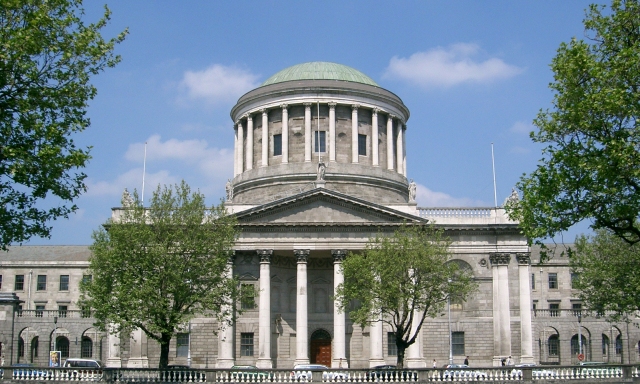EPA injunction to halt peat extraction does not stand up, court hears

November 14th, 2018
The EPA’s application for an injunction to halt “intensified” wet peat extraction at a Co Westmeath bog does not stand up as the agency was aware of activity since 2009, the High Court heard today.
The environmental watchdog is seeking the injunction to prevent Harte Peat from extracting peat from the Derrycrave site pending the outcome of an ongoing case into unregulated activity by the company.
Counsel for the EPA, Niamh Hyland SC, said yesterday that in September 2018 the agency discovered that Harte Peat was extracting wet peat on 11 hectares (ha) at the Derrycrave site up to a depth of five metres.
Ms Hyland told Mr Justice Charles Meenan that the agency was alerted after The Green News contacted the EPA for an article on extraction at Derrycrave published on 17 September 2018.
The article showed photo and drone evidence provided by the environmental charity Friends of the Irish Environment (FiE) that shows deep excavation of wet peat at the site in July and August 2018.

The Four Courts Building Photo: Gary Barber
Not a game changer
Counsel for Harte Peat, Mr Michael McDowell SC said that the environmental watchdog’s argument that the activity was a “game changer” in terms of the intensification of works is inaccurate.
He said that the EPA was made aware by FiE of deep excavation of wet peat at Harte Peat sites as early as 2009.
On foot of receiving a letter from FiE in 2009, the EPA contacted Harte Peat for details of their activities at sites in Co Westmeath.
As such, Mr McDowell argued that the EPA has effectively “been on notice” since 2009, although Mr Justice Meenan said that Harte Peat’s 2009 letter responding to the EPA’s inquiry was “a little short in detail” as to the extent of its activities.
Nevertheless, Mr McDowell said that it was clear from a failed application in 2012 for a water discharge license that the company was engaged in wet peat extraction at Derrycrave.
The application, Mr McDowell said, provides a clear description that Harte Peat is engaged in all year round activity digging out wet peat with specialised machinery.
In this light, Mr McDowell argued that the EPA was aware of activities for over six years and that “it was never a secret not is it a new activity”.
It was “abundantly clear”, he said, that the EPA was aware of the activity and that the argument that the activity at Derrycrave is something new does not stand up to scrutiny.
“It’s very clear that this is not a new activity, this is not something that has been done clandestinely,” Mr McDowell said.
Draconian and irreversible
Ms Hyland confirmed that the EPA received a copy of the application in June 2012, but that the document indicates that the average depth of excavation would be up to two metres.
Sections of the Derrycrave site, she said, has now been excavated to a depth of up to 5 meters, all the way down to the granite marl at which point no vegetation can grow back.
Ms Hyland said that the EPA “acted with expedition” after this issue was raised to its attention in September.
She said that if no injunction is granted that the “draconian and irreversible” excavation of wet peat will continue unlicensed without any proper environmental assessment.
Speed up the case
Mr McDowell said that there is “absolutely no reason why the case should not be brought to an early trial”.
Ms Hyland said, however, that Harte Peat has to date “dragged their feet in proceedings” and there were have been “very significant delays” in getting access to documents in preparation for a trial.
She said that the EPA has “taken every step that it could” to have the case heard as soon as possible and that it reacted immediately when alerted to an “intensification” of works in September.
The company are the “authors of their own misfortune,” she said as Harte Peat has “failed consistently as far back as 2009” to apply for the appropriate license.
The case is expected to conclude tomorrow.
[x_author title=”About the Author”]







